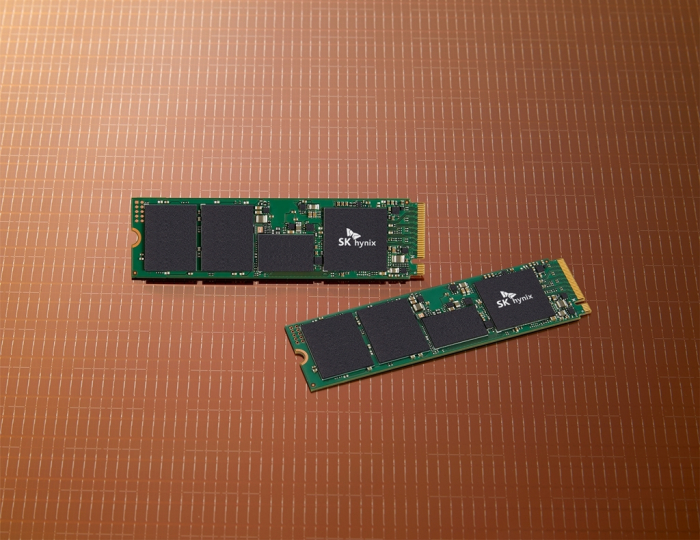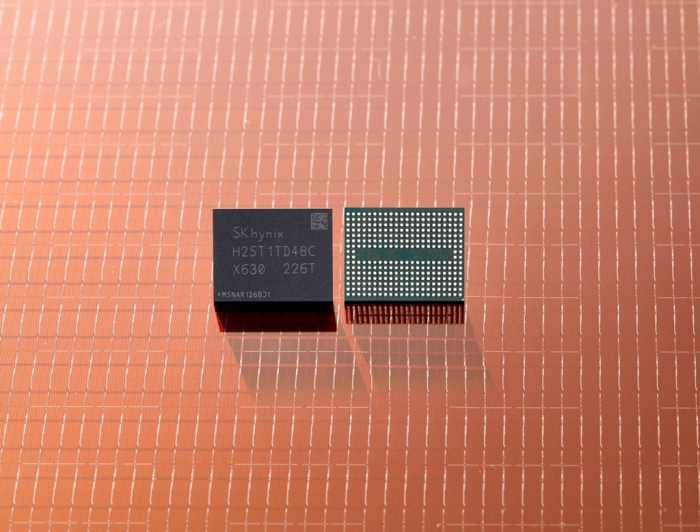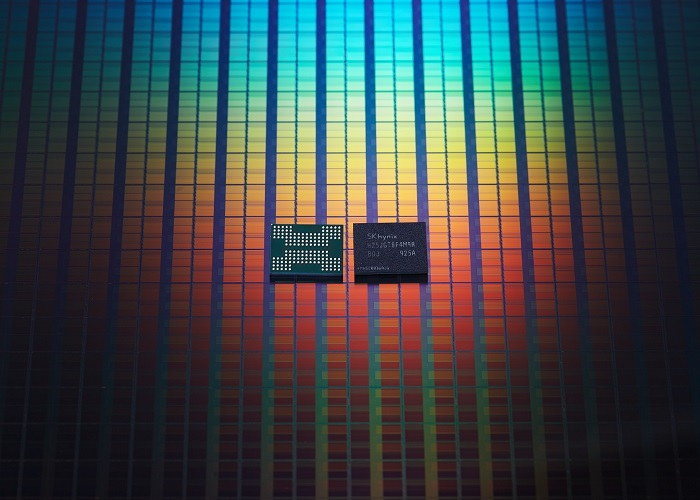SK Hynix steps up chip stacking war with 238-layer 4D NAND
The world's No.2 memory maker hopes the latest chip will help boost its earnings when the market rebound begins
By Jun 08, 2023 (Gmt+09:00)
LG Chem to sell water filter business to Glenwood PE for $692 million


KT&G eyes overseas M&A after rejecting activist fund's offer


Kyobo Life poised to buy Japan’s SBI Group-owned savings bank


StockX in merger talks with Naver’s online reseller Kream


Meritz backs half of ex-manager’s $210 mn hedge fund



SK Hynix Inc., the world’s second-largest memory chipmaker after Samsung Electronics Co., has begun mass production of the industry’s highest-layered and smallest NAND chips, intensifying the race to develop chip stacking technology to cut costs and improve performance.
The South Korean chipmaker said on Thursday it began manufacturing 238-layer, 512-gigabit (Gb) four-dimensional NAND chips in large quantities last month. Product compatibility tests with a global smartphone maker are currently underway, it said.
SK Hynix is the world’s first chipmaker to commercialize the 238-layer 4D NAND after it unveiled the chip last August as the industry’s first, amid its push to sharpen its chip stacking technology.
The latest achievement follows the company’s 176-layer NAND flash memory launched in December 2020.

LATEST CHIP TO BOOST EARNINGS
“We have secured the world’s top-tier competitiveness in terms of costs, performance and quality for both the 238-layer and the previous generation 176-layer NAND chips. We expect these products to drive earnings improvement in the second half of the year,” the company said in a statement.
The latest NAND boasts a data transfer speed of 2.4 Gb per second, a 50% improvement over the 176-layer NAND. The chip also improves read and write latency by 20% and manufacturing efficiency by 34%, enhancing its cost competitiveness.
Once its compatibility tests are completed, SK Hynix will begin supplying the 238-layer 4D NAND to smartphone makers and expand the chip’s application across its product portfolio, including PCle 5.0 solid-state drives for PCs and high-capacity server SSDs.
PCle, short for peripheral component interconnect express, is a serial-structured high-speed input and output interface used in the main boards of digital devices.
SK Hynix said it also plans to unveil double-capacity 1 terabit (Tb), 238-layer NAND products in the near future.
“We will continue to overcome NAND technology limitations and increase our competitiveness so that we can achieve a bigger turnaround than our rivals when the market rebounds,” said Kim Jum-soo, vice president and head of SK Hynix’s 238-layer NAND development team.

COMPETITION HEATS UP
Demand for NAND memory chips used in data storage devices such as hard drives and cameras has risen in recent years.
Higher-density NAND chips will accelerate data-intensive environments and workloads such as artificial intelligence (AI) engines and big data analytics. For 5G smartphones, the enhanced capacity can enable faster launching and switching across multiple apps, creating a more responsive mobile experience and faster multitasking.
A NAND flash is a type of non-volatile memory chip that stores data even when the power is off.
Global NAND players have been engaged in a game of chicken to gain ground in the fast-growing market.
In November 2020, Micron Technology Inc. surprised the market by announcing that it developed 176-layer 3D NAND flash memory, then the world’s highest-density chip at a time when most players were focused on 128-layer NAND.
Last year, the US company began producing 232-layer NAND chips in large quantities.
Samsung, the memory market leader, has also vowed to invest heavily in the NAND business to widen the gap with its rivals.
Samsung said last November it began volume production of eighth-generation 1 Tb vertical NAND (V NAND) chips, which industry officials said were 236-layered.
Write to Ye-Rin Choi at rambutan@hankyung.com
In-Soo Nam edited this article.
-
 Korean chipmakersSK Hynix unveils world's first 238-layer NAND; Samsung SSD 20 times faster
Korean chipmakersSK Hynix unveils world's first 238-layer NAND; Samsung SSD 20 times fasterAug 03, 2022 (Gmt+09:00)
3 Min read -
 Korean chipmakersSamsung’s foundry revenue exceeds mainstay NAND chip sales
Korean chipmakersSamsung’s foundry revenue exceeds mainstay NAND chip salesDec 13, 2022 (Gmt+09:00)
3 Min read -
 Korean chipmakersSamsung’s new NAND boasts industry’s highest storage capacity
Korean chipmakersSamsung’s new NAND boasts industry’s highest storage capacityNov 08, 2022 (Gmt+09:00)
2 Min read -
 Korean chipmakersSamsung, SK Hynix ahead of rivals in 200-plus-layer NAND chips
Korean chipmakersSamsung, SK Hynix ahead of rivals in 200-plus-layer NAND chipsFeb 04, 2022 (Gmt+09:00)
3 Min read -
 Korean chipmakersNAND competition heats up as SK Hynix unveils 176-layer flash memory
Korean chipmakersNAND competition heats up as SK Hynix unveils 176-layer flash memoryDec 07, 2020 (Gmt+09:00)
3 Min read -
 Korean chipmakersGlobal NAND market in game of chicken as Samsung ups ante
Korean chipmakersGlobal NAND market in game of chicken as Samsung ups anteDec 01, 2020 (Gmt+09:00)
3 Min read -
 Korean chipmakersSamsung, SK Hynix challenged by underdog Micron’s 176-layer NAND
Korean chipmakersSamsung, SK Hynix challenged by underdog Micron’s 176-layer NANDNov 16, 2020 (Gmt+09:00)
2 Min read


